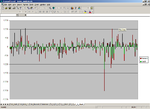Yamato
Legendary member
- Messages
- 9,840
- Likes
- 246
E.P.Chan's Quantitative Trading
Page 157:
http://www.amazon.com/Quantitative-...hmic-Business/dp/0470284889#reader_0470284889
Page 157:
...And yet, ever since I began my career in the institutional quantitative
trading business, I have spoken to many small, independent
traders, working in shabby offices or their spare bedrooms, who
gain small but steady and growing profits year-in and year-out, quite
unlike the stereotypical reckless day traders of the popular imagination.
In fact, many independent traders that I know of have not
only survived the periods when big funds lost billions, but actually
thrived in those times. This has been the central mystery of trading
to me for many years: how does an independent trader with insignificant
equity and minimal infrastructure trade with high Sharpe ratio
while firms with all-star teams fail spectacularly?
At the beginning of 2006, I left the institutional money management
business and struck out on my own to experience this firsthand.
I figured that if I could not trade profitably when I was free of
all institutional constraints and politics, then either trading is a hoax
or I am just not cut out to be a trader. Either way, I promised myself
that in such an event I would quit trading forever. Fortunately, I survived.
Along the way, I also found the key to that central mystery to
which I alluded earlier.
The key, it turns out, is capacity, a concept I introduced at the
end of Chapter 2. (To recap: Capacity is the amount of equity a strategy
can generate good returns on.) It is far, far easier to generate
a high Sharpe ratio trading a $100,000 account than a $100 million
account. There are many simple and profitable strategies that can
work at the low capacity end that would be totally unsuitable to
hedge funds. This is the niche for independent traders like us.
Let me elaborate on this capacity issue. Most profitable strategies
that have low capacities are acting as market makers: providing
short-term liquidity when it is needed and taking quick profits
when the liquidity need disappears. If, however, you have billions
of dollars to manage, you now become the party in need of liquidity,
and you have to pay for it. To minimize the cost of this liquidity
demand, you necessarily have to hold your positions over long periods
of time. When you hold for long periods, your portfolio will
be subject to macroeconomic changes (i.e., regime shifts) that can
cause great damage to your portfolio. Though you may still be profitable
in the long run if your models are sound, you cannot avoid the
occasional sharp drawdowns that attract newspaper headlines.
Other disadvantages beset large-capacity strategies favored by
large institutions. The intense competition among hedge funds
means the strategies become less profitable. The lowered returns
in turn pressure the fund manager to overleverage. To beat out the
competition, traders need to resort to more and more complicated
models, which in turn invite data-snooping bias...
http://www.amazon.com/Quantitative-...hmic-Business/dp/0470284889#reader_0470284889


